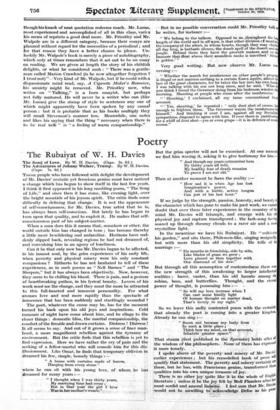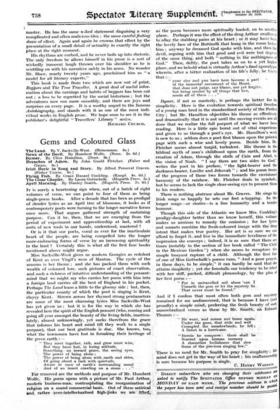Poetry
The Rubaiyat of W. H. Davies
The Song of Love. By W. H. Davies. (Cape. 3s. 6d.) The Adventures of Johnny Walker, Tramp. By W. H. Davies.
(Cape. 7s. 6d.) .
THOSE people who have followed with delight the development of Mr. Davies' ecstatic yet ferocious genius must have noticed a change which has begun to -shwa, itself in the last few yeais. I think it first appeared in his long rambling poem, " The Song of Life," and since then it has come, like evening light, over the bright noontide of his joyous spirit. The critic finds some difficulty in defining that change. It is not the appearance of self-consciousness, for Mr. Davies, true artist that he is, has always been self-conscious. But lately he has begun to turn upon that quality, and to exploit it. He makes that self- consciousness part of his subject-matter.
When a man does this it means that, somehow or other, the world outside him has changed in tone ; has become thereby a little more bewildering and unfamiliar. Horizons have sud- denly slipped back, revealing regions he had not dreamed of, and convulsing him in an agony of loneliness.
Can it be that only now has Mi. Davies begun to be affected, in his inmost soul, by the grim experiences of his early life, when poverty and physical misery were his only constant companions ? Hitherto he has not hesitated to tell of these experiences, as in such poems as " Nell Barnes " and " The Sleepers," but it has always been objectively. Now, however, they seem to be chilling his blood. There is pain, and a gesture of heartbreaking pathos, in his lyrical beauty. Lovers of his work must see the change, and they must the more be attracted to this full-hearted and innocent personality. For what arouses love and zeal more rapidly than the spectacle of
innocence that has been suddenly and startlingly wounded ? The poet, whatever the cause may be, has for the moment turned his back upon his old joys and inspirations. Cold rumours of night have come about him, and he clings to the closer things : domestic bliss, the marital companionship, the comfort of the fireside and drawn curtains. Distress ! Distress !
It all seems to say. And out of it grows a sense of finer man- hood, a more magnificent rebellion against the -tyranny of environment. But the critic feels that this rebellion is yet to find expression. Here we have rather the cry of pain and the seeking of a fellow-mortal who will console him for this dis- illusionment. Like Omar, he finds that temporary oblivion in dreamed his few, simple, homely things :--
" A house with curtains made of leaves, -Hanging from every stone "
where he can sit with his young love, of whom he has dreamed for many years :—
" I thought when I was thirty years, My marrying time had come ; But in that year the girl I love Was in her mother's womb."
But the grim spectre will not be exorcised. At one moment we find him wooing it, asking it to give testimony for hint:-
" And though my years outnumber hers
By thirty years all told, My healthy fear of death remains To prove I am not old."
Then at another moment he faces the reality :-
" How sad it is when Age has lost Imagination's power,
And with a feeble, active tongue Can jest of his last hour."
If we judge by-the 'strength, passion, honesty, and beauty al the character which has gone to make his past work, we cannot doubt that over these later experiences in the country of tit mind Mr. Davies will triumph, and emerge with his oil physical joy and rapture transfigured ; the lark-song hie* soared up through rheumy clouds to a rarer air and a mot
crystalline light. _
In the meantime we have his Rubaiyat. He " cultivate his garden," and sits there, Philemon-like, singing resignedly, but with more than his old simplicity. He tells of hi
marriage :—
" Six months in friendship, side by side, Like blades of grass we grew ;
Love pinned us then together with One diamond of his dew."
But through all this assumption of contentedness there runs the new strength of this awakening to larger intellectual realities ; barer, vaster, than his old haunts among the robins, bees, and butterflies. Thought, and the eternal power of thought, is possessing him :— " So will my love increase when I Can cast some kindly light
Of human thought on matter dead, That's lovely, to my sight."
So, we leave this sadly contented poem with the certaialy that already the poet is coming into a greater kingdom' Already he can sing :— " Scorn not because my- body lives In such a little place ;
Think how my mind, on that account, Inhabits greater space."'
That stanza (first published in the Spectator) holds after dl the wisdom of the philosophers. None of them has expres4d it more tersely.
I spoke above of the poverty and misery of Mr. Davis'
earlier experiences ; but his remodelled book of prose 14 qualify that statement. The poverty and misery certainly are
there, but he has, with Franciscan genius, transformed the/ qualities into his own unique treasure of joy.
There is no other joy quite like it in the whole of Engli'sb literature ; unless it be the joy felt by Moll Flanders after her most sordid and amoral liaisons. I feel sure that Mr. would not be unwilling to-. acknowledge. Defoe as his Pit"( master. -He .has the same inked statement diszuising a very complicated and often malicious idea ; the same careful flatting down of effect. Again and again he crowns that effect by the presentation of a small detail of actuality in exactly the right place at the right moment.
His rhythms are curbed, and he never boils up into rhetoric. The only freedom he allows himself in his prose is a sort of, wickedly innocent laugh thrown over his shoulder as he is scuttling on with his narrative safely in his arms. No wonder. Mr. Shaw, nearly twenty years ago, proclaimed him as " a model for all literary experts."
This book is made from two which are now out of print, Beggars and The True Traveller. A great deal of useful infor- mation about the earnings and habits of beggars has been cut out ; a loss to be regretted by the social historians ; but the adventures now run more smoothly, and there are joys and surprises on every page. It is a worthy sequel to the famous Autobiography, and stands with it as one of the most indi- vidual works in English prose. We hope soon to see it in the publisher's delightful " Travellers' Library " series.
RICHARD CHURCH.



























































 Previous page
Previous page